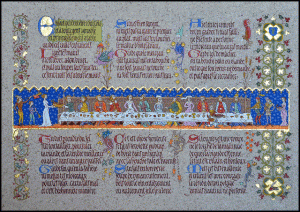 I’ve been thinking a lot about the impact of words lately. I’ve had a number of editing jobs, covering different types of material: a biblical fantasy, a children’s book, an academic thesis, and a scholarly analytic volume. Each required a different type of “language.” After all they are talking to very different audiences. But they aren’t the only prompts for the musing.
I’ve been thinking a lot about the impact of words lately. I’ve had a number of editing jobs, covering different types of material: a biblical fantasy, a children’s book, an academic thesis, and a scholarly analytic volume. Each required a different type of “language.” After all they are talking to very different audiences. But they aren’t the only prompts for the musing.
I’ve also been going through the manuscript of my own (currently unfinished) fantasy novel The Ring of Adonel. As one way of working my head back into it (in order to finish this opus), I’ve been creating a database of people, places and things mentioned in the story. This includes the specialty terms I’ve created for that fantasy world. The thing is, when you’re building a fantasy world of your own, and you want to consider certain types of issues, you want to avoid “real world” terms that might pull the reader out of your imagined one.
So, the other day, one of my friends posted a link to an excellent blog about words to avoid when writing a period screenplay. And I agree with all the points made – especially the use of “okay.” That one word especially, when it shows up in a non-modern fantasy story, can bounce me out of the fantasy realm. It just does not fit. But I do understand for the writer how easy it is to pop that in during the flush of pushing the prose forward.
Several years ago, I wrote a column about style in writing for fantasy. When I look back at it now, even the prose of the column itself makes me smile. It’s a bit on the stilted side, as it was written during the height of my scholarly days. But the points are still reasonable. The language we use helps create the illusion of the world we are spinning into creation.
Now, certainly, there are plenty of films that break this mold. Certainly there have been period films that have not attempted to get rid of modern phrases or concepts (the Kevin Costner film Robin Hood: Prince of Thieves for one). But that very fact tends to keep the audience at a distance from the world. By contrast, the History Channel series Vikings, works much harder at keeping modern references out of the mix. The results there are immersive: we are drawn into that world, where even with its multilingual setting everything remains clear.
Some writers get anxious about this whole issue. They don’t feel confident about their mastery of the phrasings of another era, or familiar with the slang of a different age. But you don’t have to have all of that down. It’s possible to create the feel of an “other where” or “other when” just by avoiding too many modern references, metaphors, and clichés and contractions. “Pedal to the metal” belongs to the automotive age, especially once racing became prevalent, for instance. Know what the references are in the phrases you use, and you should be able to keep your historical period tale or fantasy or science fiction story uninfected by our present day effects.


